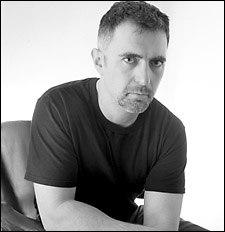Godfrey-Smith joins FAS as professor of philosophy
Peter Godfrey-Smith, whose work at the intersection of philosophy and biology has provided striking philosophical analysis of the nature of genetics and evolution, has been appointed professor of philosophy in Harvard University’s Faculty of Arts and Sciences, effective Jan. 1.

Since 2003, Godfrey-Smith, 40, has divided his time between Australian National University in Canberra, where he has been professor of philosophy, and Harvard, where he has been visiting professor of philosophy. He was on the Stanford University faculty from 1991 to 2003.
“Professor Godfrey-Smith is a rising star in the philosophy of biology,” says William C. Kirby, Edith and Benjamin Geisinger Professor of History and dean of the Faculty of Arts and Sciences. “He has already made major contributions to questions about genetic selection, the nature of genetic coding, and the evolution of mental capacities, and he is a superlative teacher and mentor, judging from the accolades he has received both at Stanford and at Harvard. His rigorous yet engaging courses in the philosophy of science have been, and will continue to be, great assets for our students.”
Godfrey-Smith’s research in the philosophy of biology has ranged over a wide variety of topics. His 1996 book “Complexity and the Function of Mind in Nature” (Cambridge University Press) investigated the idea that mental abilities are adaptations that increase an organism’s fitness in complex environments. In this book Godfrey-Smith connected this theory with themes from earlier philosophers, carefully refining it and examining what biological evidence exists to support or refute the hypothesis.
Godfrey-Smith has also made important contributions to the debate about the unit of natural selection, co-authoring an influential 1993 article titled “The Dimensions of Selection” with noted Harvard evolutionary biologist and geneticist Richard Lewontin. His work has clarified the different senses in which a biological feature’s function can illuminate its evolutionary history. He has argued that the notion of genetic “coding” may overstate the causal role genes play in the production of traits, suggesting that the available empirical evidence should limit discussions of coding to much more specific contexts.
A native of Sydney, Godfrey-Smith earned a B.A. from the University of Sydney in 1987 and a Ph.D. in philosophy from the University of California, San Diego, in 1991. Later that year, he joined the Stanford faculty as an assistant professor of philosophy, earning promotion to associate professor in 1998. At Stanford he received the Dean’s Award for Distinguished Teaching and was named a Dean’s Fellow in the Humanities, both in 1994, and he received the Association of Stanford University Students Teaching Award in 2001. Godfrey-Smith has served as associate editor of Biology and Philosophy since 2000.




